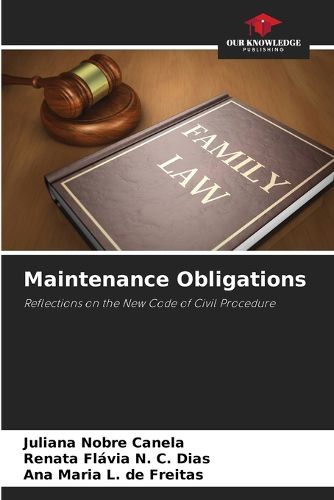Readings Newsletter
Become a Readings Member to make your shopping experience even easier.
Sign in or sign up for free!
You’re not far away from qualifying for FREE standard shipping within Australia
You’ve qualified for FREE standard shipping within Australia
The cart is loading…






The purpose of this paper is to evaluate the institute of Maintenance in the light of the new rules introduced by Law 13.105 of 2015 (New Code of Civil Procedure), pointing out the paths that will be taken by the enforcer and the enforced in the face of collection from the former and default by the latter. However, it is necessary to take a look at the family and its changes throughout history, highlighting the duties of parents towards their children, and then focus on the subject of maintenance, also providing a brief historical and conceptual approach. The new ways of collecting alimony are emphasised. And, within this context, are the new rules brought in by the Civil Procedure Code stricter when it comes to enforcement? What has changed? The objective lies precisely in the possibility of discussing the issue in search of possible solutions, providing a fruitful and mature legal and academic discussion. For this discussion, it will be necessary to carry out bibliographical research, using authors who deal with the subject in question, with the aim of clarifying the questions raised here, in order to understand the theme presented.
$9.00 standard shipping within Australia
FREE standard shipping within Australia for orders over $100.00
Express & International shipping calculated at checkout
The purpose of this paper is to evaluate the institute of Maintenance in the light of the new rules introduced by Law 13.105 of 2015 (New Code of Civil Procedure), pointing out the paths that will be taken by the enforcer and the enforced in the face of collection from the former and default by the latter. However, it is necessary to take a look at the family and its changes throughout history, highlighting the duties of parents towards their children, and then focus on the subject of maintenance, also providing a brief historical and conceptual approach. The new ways of collecting alimony are emphasised. And, within this context, are the new rules brought in by the Civil Procedure Code stricter when it comes to enforcement? What has changed? The objective lies precisely in the possibility of discussing the issue in search of possible solutions, providing a fruitful and mature legal and academic discussion. For this discussion, it will be necessary to carry out bibliographical research, using authors who deal with the subject in question, with the aim of clarifying the questions raised here, in order to understand the theme presented.